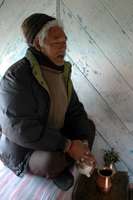December 14, 2009 weblog
Efforts to save endangered languages

(PhysOrg.com) -- There are an estimated 6,500 languages in the world, with around fifty percent of them endangered and likely to cease to exist by 2100, but efforts are now being made to save them from extinction.
Languages are dying out around the globe through globalisation, social change, a shift in populations from rural areas to cities, and often well-intentioned education in national languages and national cultures rather than local indigenous languages and traditions. Of the 6,500 languages estimated by UNESCO to be still in use, only 11 are spoken by half the world's population, and 95 percent of the languages are spoken by five percent of the global population.
A new project, the World Oral Literature Project, led by anthropologist Dr Mark Turin of the University of Cambridge's Museum of Archaeology and Anthropology, aims to preserve the linguistic diversity being lost as elders die and young people turn to the national languages taught in schools and used by the media. The project is recording and documenting languages that face the prospect of dying out, with the goal of preserving their poems, chants, stories, and anything else that can be recorded.
Turin receives boxes of DVDs from small indigenous communities around the world, who hope the project will preserve their language and literature for future generations. The project uses a range of media including voice recorders, video cameras and other multimedia technologies, and is building a digital archive that will be accessible on demand both by academics and by people of the communities themselves.
An oral tradition is central for many of the groups, rather than a written tradition, and many communities have never had their songs and stories recorded by anyone. Groups collaborating with anthropologists to have their languages recorded for the first time are widespread, and include communities such as the Amurdag community in Northern Australia, the Maka in Paraguay, Chulym in Siberia, and the Kallawaya community in Bolivia.
The idea for the project began when Turin documented the language of the Thangmi community in Nepal for his PhD in endangered languages at Leiden University in The Netherlands. The choice of language was random, with Turin selecting the community from a map on his supervisor's study wall. The language was virtually unknown outside the tiny community, and was completely undocumented.
Turin's project eventually created a trilingual word list in Thangmi, Nepali, and English, that is still sold in the community and which is being used to teach children about their own language and heritage. Turin said he was amazed so few linguists are working on endangered languages, and people "do PhDs on the apostrophe in French," but no one knows precisely how many undocumented languages there are. When a language ceases to exist, so does its cultural world view, and much of the heritage of the community is lost.
The World Oral Literature Project has secured funding of £30,000 to aid communities in the recordings. Its first international workshop is to be held in Cambridge this week. Similar projects are being carried out by National Geographic and their Enduring Voices project, the Arcadia fund, and the Hans Rausing Endangered Languages Project. It is also worth noting that in Europe there are many languages in need of efforts to preserve them, such as Cornish in England, Gaelic in Scotland, and Breton in France.
More information: World Oral Literature Project
The World Oral Literature Project is currently seeking sustainable long-term funding to ensure that it can make a permanent contribution to the
urgent documentation of endangered traditions.
© 2009 PhysOrg.com















